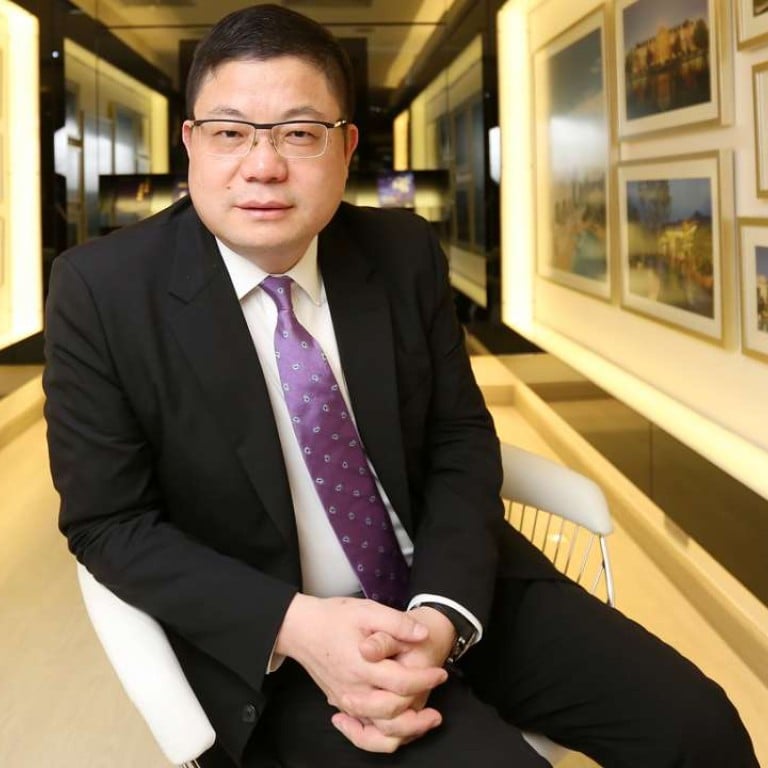
Chinese developer Greentown China Holdings expects 2017 to be a window for land acquisitions
Chief executive Cao Zhounan says focus is to stay profitable and avoid past mistakes
The wheel has turned a full circle for Greentown China Holdings. The company, which was veering towards bankruptcy in 2014 and had even sold a majority stake to state-owned China Communications Construction Group in 2015, has not only emerged unscathed and is now China’s ninth largest developer in terms of sales. Not surprisingly, the Hangzhou-based developer edged towards another milestone when its contract sales crossed the “100 billion yuan” (US$14.5 billion) mark for the first time last year.
Cao Zhounan, who replaced Shou Bonian as chief executive officer of Greentown in 2015 has not only been an integral part of the turnaround, but was also responsible for steering the developer onto the rapid growth track. The 47-year-old Cao, who joined Greentown in 2009, admits that he is continuing founder and co-chairman Song Weiping’s legacy of high quality, even as he strives to run the business in a cost-effective manner and avoid previous mistakes.
It was this cautionary approach that saw Greentown almost suspending land purchase in the second half of 2016 as China’s property market sizzled with record land prices. “We thought it was risky to dip our toes. Being conservative was worthwhile,” Cao said.
That said, Cao, says that the company’s current land bank is not sufficient. He also expects land prices to fall this year as Chinese authorities have rolled out a series of home-purchase curbs. According to Cao, Greentown will speed up land acquisitions this year to accumulate inventory on dips.

What have been the biggest changes for Greentown since 2015?
The past two years were more a period of consolidation for Greentown. We were in serious trouble. Despite being a high-profile developer, in 2015 we had to sell a controlling stake. It was surprising as our homebuilding quality was the best among Chinese developers. That said, we also had several problems in our operations and finances. So for the last two years, we have been gradually developing the business and resolving the old problems. We have consecutively cut construction costs by 5 percentage points in the past two years, which is big, and took a lot of effort. I can say now that our products are one of the best budget picks in the market.
A big change is we have separated management and ownership. For the three biggest shareholders, China Communications Construction Group, The Wharf (Holdings) and founder Song Weiping, no matter who has a suggestion, they need to seek approval for the same through a board meeting, which is a significant step forward in our corporate governance.
We have also accomplished company reforms by redividing it into five segments under one holding company. Greentown Real Estate focuses on the investment and development of real estate projects while Greentown Project Management deals with the agent construction business. Greentown Asset Management is engaged in asset securitisation of our holding commercial properties, while Greentown Town Development concentrates on building ideal towns. Greentown Living Services providing home maintenance services. Our efforts are to make each of these units more professional so that we can become the first integrated service provider for ideal lifestyle in mainland China.
Greentown’s sales target for 2017 is 100 billion yuan. This is less than what it has achieved last year? Do you think it is too conservative?
Although our sales exceeded 110 billion yuan last year, I feel there are problems in China’s property market, it is too crazy. We bought very few land parcels since last May, saying no to overpriced sites, because we believed the market frenzy was not sustainable.
As the market is beginning to cool down after the government imposed curbs, many mid- and small-sized developers who paid sky-high prices for land parcels last year may collapse. The selling price cap set by the government could kill many developers.
Luckily Greentown is off the hook this time and we have a lot of cash in hand. Although the strategy has led to fewer land reserves, it is much better than having too many expensive land parcels.
Will Greentown accelerate land acquisitions in 2017?
Yes. That is for sure. We expect land prices will go down this year due to the government’s home price controls. If there are still any problems in our business, then that is the land bank. We need more land.
Having decided to adopt countercyclical investment strategy, we will invest heavily when the market is bad. We have already prepared 70 billion yuan budget for land purchase this year. In the past two years, we spent about 49 billion yuan for land purchases. Most of it went for good sites that others had ignored, such as the Jiuxianqiao block in Beijing.
Having said that, the property market fever remains high. For developers, it is very difficult to win prime land now. A land parcel can cost 10 billion yuan in a first- tier city and 5 billion in a second-tier city. So I suggest that developers don’t simply pursue sales scale as it has no meaning. We are now more focused on maintaining steady profit growth and high cash collection.
How is Greentown’s new businesses doing?
All of our diversified businesses serve our core real estate business. For example, our finance unit is seeking to do financial leasing and factoring business. When the government set a price cap on the new project we want to sell which is lower than we expected, we can sell the project to our financial leasing platform first, and then sell it as existing homes which will not have price limits. Besides, recently China Securities Regulatory Commission approved our 1.6 billion yuan account receivable factoring – the first among mainland developers. The unit also holds commercial properties worth 22 billion, which can be securitised in the future. In short, the finance unit can provide us rich cash for investment. Later we may also buy a stake in city commercial banks.
How is your agent construction business developing?
The demand for agent construction is huge especially when there is policy tightening. When the market is not good, small developers will be particularly under pressure and they need to borrow the resources from a well-recognized developer. For example, financial institutions may refuse to give credit to a smaller developer, but if it partners with us, as our parent is a state-backed company, financial institutions would love to give the project guarantees. We can consolidate all the social resources from planning, design to material supply, but we don’t buy any interest in the agent construction projects. We charge 5 per cent of the actual sales as management fee, so the margins could be very high.

